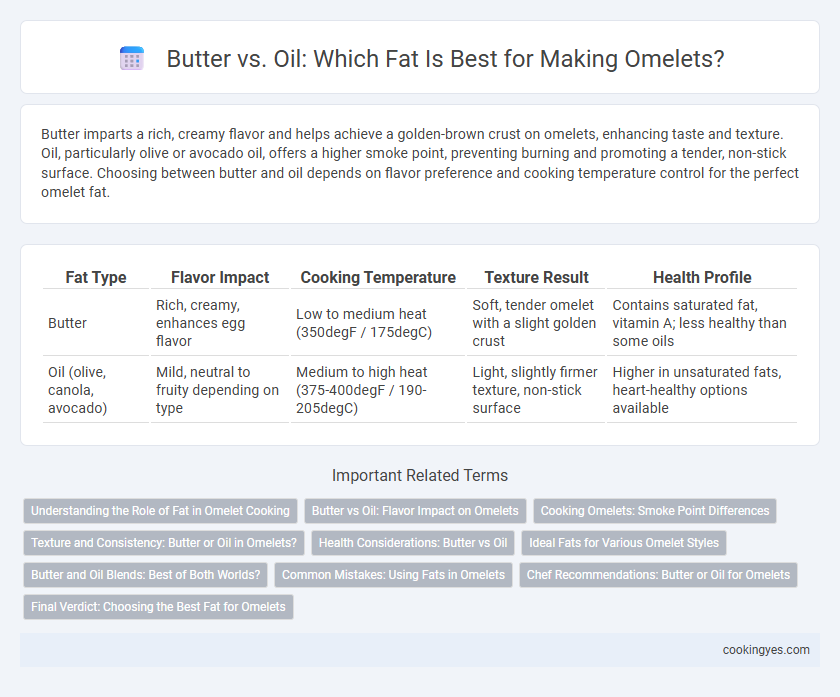Butter imparts a rich, creamy flavor and helps achieve a golden-brown crust on omelets, enhancing taste and texture. Oil, particularly olive or avocado oil, offers a higher smoke point, preventing burning and promoting a tender, non-stick surface. Choosing between butter and oil depends on flavor preference and cooking temperature control for the perfect omelet fat.
Table of Comparison
| Fat Type | Flavor Impact | Cooking Temperature | Texture Result | Health Profile |
|---|---|---|---|---|
| Butter | Rich, creamy, enhances egg flavor | Low to medium heat (350degF / 175degC) | Soft, tender omelet with a slight golden crust | Contains saturated fat, vitamin A; less healthy than some oils |
| Oil (olive, canola, avocado) | Mild, neutral to fruity depending on type | Medium to high heat (375-400degF / 190-205degC) | Light, slightly firmer texture, non-stick surface | Higher in unsaturated fats, heart-healthy options available |
Understanding the Role of Fat in Omelet Cooking
Butter enhances omelet flavor with its rich, creamy taste and helps achieve a delicate, golden-brown texture due to its milk solids. Oil, such as olive or vegetable oil, provides a higher smoke point, reducing the risk of burning and allowing even cooking at higher temperatures. The choice of fat directly influences the omelet's taste, texture, and cooking control, making it essential to match fat type with desired culinary outcomes.
Butter vs Oil: Flavor Impact on Omelets
Butter enhances the flavor of omelets by adding a rich, creamy taste and a slight nuttiness from browning, which oil lacks. Oils like olive or vegetable provide a more neutral flavor, allowing the fillings to stand out without overpowering the dish. The choice between butter and oil ultimately influences the omelet's overall taste profile, with butter offering a more indulgent and savory experience.
Cooking Omelets: Smoke Point Differences
Butter and oil differ significantly in smoke points, affecting omelet preparation. Butter's smoke point is about 350degF (175degC), which allows for rich flavor but requires careful heat control to avoid burning. In contrast, oils like canola or vegetable oil have higher smoke points around 400degF (204degC) or more, enabling faster cooking without smoking, ideal for fluffy omelets.
Texture and Consistency: Butter or Oil in Omelets?
Butter enhances omelets with a rich, creamy texture and contributes to a tender consistency due to its milk solids and water content, which promote gentle browning. Oil, especially neutral oils like canola or vegetable oil, delivers a smoother, slightly more elastic texture without the distinctive buttery flavor, allowing the omelet to maintain a consistent structure. Choosing butter results in a moist, fluffy omelet with slight crisp edges, while oil produces a silkier, more uniform finish.
Health Considerations: Butter vs Oil
Butter contains saturated fats and cholesterol, which can raise LDL cholesterol levels and potentially increase the risk of heart disease when consumed in excess. Oils such as olive or avocado oil offer healthier unsaturated fats that support cardiovascular health by improving cholesterol profiles and reducing inflammation. Choosing oils with high smoke points also minimizes the formation of harmful compounds during cooking, making them a healthier option for omelet fat.
Ideal Fats for Various Omelet Styles
Butter offers a rich, creamy flavor and ideal browning for classic French-style omelets, while oil provides a higher smoke point suitable for fluffy American or folded omelets. Olive oil adds a subtle fruitiness perfect for Mediterranean variants, whereas coconut oil imparts a mild sweetness ideal for tropical-inspired omelets. Selecting the appropriate fat enhances texture and taste, tailoring the omelet to specific culinary styles.
Butter and Oil Blends: Best of Both Worlds?
Butter provides a rich, creamy flavor and helps create a tender omelet with a slightly crispy edge due to its milk solids caramelizing during cooking. Oil offers a higher smoke point, preventing burning and allowing for even cooking. Blending butter with oil combines the buttery taste and browning benefits with oil's heat stability, resulting in a perfectly cooked omelet with enhanced texture and flavor.
Common Mistakes: Using Fats in Omelets
Using too much butter in omelets can cause excessive browning and a greasy texture, while insufficient oil may lead to sticking and uneven cooking. Common mistakes include overheating fats, which breaks down butter's milk solids and results in a burnt flavor, and choosing oils with high smoke points that lack buttery taste. Balancing the right amount and type of fat--such as clarified butter or a mix of butter and neutral oil--ensures a tender, flavorful omelet with perfect texture.
Chef Recommendations: Butter or Oil for Omelets
Chefs often prefer butter for omelets due to its rich flavor and ability to create a tender, golden-brown texture. Oil, especially olive or avocado oil, is favored for its higher smoke point and neutral taste, preventing burning during high-heat cooking. Balancing flavor and cooking temperature is key, with many chefs recommending a combination of butter and oil for optimal omelet texture and taste.
Final Verdict: Choosing the Best Fat for Omelets
Butter provides a rich, creamy flavor and helps achieve a golden, slightly crispy edge on omelets, while oil offers a higher smoke point and a neutral taste, preventing burning at higher heat. Choosing butter enhances the omelet's texture and taste, especially for classic French omelets, whereas oil is better suited for those seeking a lighter, less buttery flavor or cooking at higher temperatures. For the best balance of flavor and cooking control, many chefs prefer butter for its taste and oil for heat tolerance, sometimes using a combination of both.
Butter vs Oil for Omelet Fat Infographic

 cookingyes.com
cookingyes.com